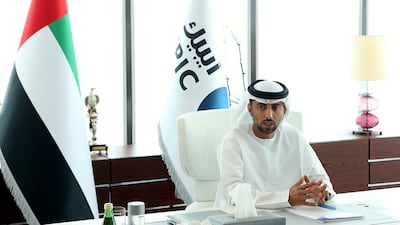The Minister of Energy, Suhail Al Mazrouei, yesterday said he sees big growth opportunities, especially for petrochemicals, in the merger of Mubadala Development Co and International Petroleum Investment Co (Ipic).
“The merger will create an opportunity for us to consolidate our efforts and to forge partnerships that would be capable of enhancing global competitiveness and opening new markets for us and our companies,” said Mr Al Mazrouei, who is also the managing director of Ipic and one of the triumvirate steering the merger through, with Mubadala Development’s chief executive, Khaldoon Al Mubarak, under chairman Sheikh Mansour bin Zayed Al Nahyan.
On the merger, the minister said: “Teams are working day and night and we hope we would be able to make the announcement by the end of the year.”
The intention to merge was announced in the summer, but the details are being hammered out by teams from the two companies, with advice from consultants Bain & Co, as well as branding adviser Landor Associates. The merger is expected to be formalised through an announcement setting out the details before the end of the year.
The combined group had assets valued at the end of last year at about US$125 billion, with the energy portfolio making up about two-thirds of Ipic’s assets and about 10 per cent of Mubadala’s, including Mubadala Petroleum, of which Mr Al Mazrouei is chairman.
The structure of the new company, including its divisions, which span aerospace and defence, information and communications technologies, metals manufacturing, as well as energy, has not yet been finalised, including the shape of the diverse energy interests, covering the Masdar renewables portfolio, power utilities, as well as oil, gas and petrochemicals investments.
But Mr Mazrouei said the new structure would open up opportunities to meet Abu Dhabi’s strategic goals of diversification and job creation.
“Establishing this investment fund would lead to a quality economy for future generations and will promote a diversified economy,” he said. “It would enhance our competitiveness in the petrochemical industry, especially, working in tandem with Adnoc.”
Ipic’s petrochemicals interests were highly profitable last year, at a time when oil and gas was suffering. For example, Borouge, which is a joint venture between Adnoc and Borealis (64 per cent owned by Ipic, with the rest owned by Austrian oil company OMV, which is in turn 25 per cent owned by Ipic), reported $1.3bn in earnings on $3.8bn in revenue last year.
Borouge has been the focus of Abu Dhabi’s petrochemicals development since it was founded in 1998 and recently ramped up its third expansion phase at Ruwais, adjacent to Adnoc’s main oil refinery in Abu Dhabi’s Western Region, with the $4bn project more than doubling capacity from 2 million tonnes to 4.5 million tonnes. The plant is now the world’s largest integrated polyolefins complex.
“Now, we are looking at Borouge 4 ... and Nova [Chemicals, another Ipic division] could step in, for example, for Borouge 5,” the minister said, noting that petrochemicals gives the company downstream exposure to expanding markets for products from detergents to car parts, especially in key expanding markets China and India.
He also noted that the merger creates the opportunity to bring international interests, such as North America-focused Nova, to the Middle East, as well as overseas synergies.
The combined company will have oil and gas production outside of Abu Dhabi of more than 850,000 barrels of oil equivalent per day (boepd) with refining capacity of 1.5 million bpd, including its wholly-owned subsidiary Cepsa, and 21 per cent holding in Japan’s Cosmo Oil.
“The combination of all the companies creates a huge integrated oil and gas company ... but [it] does not need an integration of those companies at this stage,” Mr Al Mazrouei said.
Instead, a key change will be that project investment decisions will be made at operating company level rather than by headquarters, which would affect pending projects such as a planned $3.5bn refinery at Fujairah, which Ipic was expected to green light in the summer last year.
“The difference in strategy that I worked with the board of Ipic on is to have the investee companies invest in the project, not the holding [company],” Mr Al Mazrouei said. “So, we are pushing all of those projects which were handled by the corporate to the investee companies, who are investing in this business, who will look at it, and the expansion in Fujairah is one of those projects that we are looking at.”
The merger will also expand Ipic’s exposure to 30 countries from 20 countries and allow it to leverage its presence. For example, Mubadala’s power interests and Cepsa’s upstream interests in Algeria might create the opportunity for petrochemical expansion there.
“This is the concept that will be tested when the whole company is merged,” the minister said.
amcauley@thenational.ae
Follow The National's Business section on Twitter

